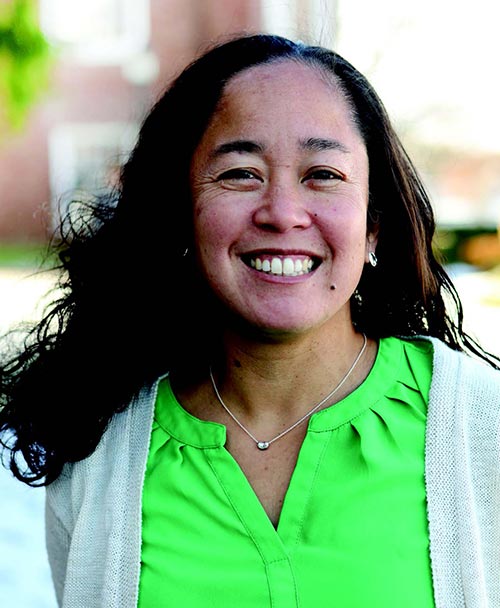
Melissa Roja Lawlor Named Upper School Director of Equity and Inclusion
 In her new position as Upper School director of equity and inclusion, Melissa Lawlor wants all students at Milton to feel they can be their true selves.
In her new position as Upper School director of equity and inclusion, Melissa Lawlor wants all students at Milton to feel they can be their true selves.
Her own journey—both personal and professional—is what brought Lawlor to this juncture in her life. Growing up, she attended an independent high school in California, and, for more than 16 years, she has served as a teacher, coach, and dorm parent at independent schools in both New York and New Hampshire.
What drives her, she says, is her own experience in high school struggling to assert her identity as one of only a few students of color.
“I had wonderful teachers who saw me, but institutionally it was difficult,” she says. “I felt really disconnected from my Filipino identity, and I love that part of me. But I hid it for so long in high school. So much of what I do in this office is think about ‘What do folks need to be able to embrace pieces of themselves that they feel initially they should hide at a predominantly white school?’ That’s really become the focus of my life’s work.”
Lawlor arrived at Milton in July after 11 years at Brewster Academy, in Wolfeboro, New Hampshire, where she built a DEIJ program from the ground up. Brewster, she says, was successful in attracting students of color, but had few plans in place to support them. As director of the program, Lawlor piloted the school’s first equity and inclusion program, created a faculty professional development program, developed a curriculum that included issues around identity, and established a support system for students of color.
Last summer, Lawlor, with her husband, Matt, who was recently appointed Milton’s associate athletic director, moved to Milton with their three young sons to become Milton’s first Upper School director of equity and inclusion. She was attracted to Milton by the work the school has already begun around equity and inclusion.
“Part of the draw was that Milton has a definitive community priority for anti-racism and anti-oppression work,” she says. “The fact that Milton was establishing a team aspect for equity, inclusion, and justice with a well-defined strategy was a real plus.”
According to Lawlor, the challenge now becomes how Milton reckons with the past and begins to move forward. “Milton’s Transition Program is 37 years old,” she says. “I’m coming into a program with an historically articulated commitment, but a commitment to DEIJ looks different today at Milton than it did even five years ago.
“There are some people in this community whose identities are feeling the effects of oppression or marginalization. So the challenge becomes, how do we as a team make sure these children and adults feel validated, seen, and empowered—and how do we cultivate the kind of culture that will support this?”
Lawlor wants to be a part of creating an environment at Milton that addresses issues of equity, inclusion, and justice in a healthy, restorative manner that calls people in to repair. “It’s important in how we hold people accountable,” she says. “I’ve seen shame and blame used as the only accountability tools, and it sometimes runs counter to the goal; it creates a toxic environment.”
“We’re at a pivotal moment where we need to establish the tools that help people take responsibility for past hurts, learn how to repair, and identify a restorative path forward that allows for growth as a community,” she says. “In the end, my hope is that these are practices that allow us to grow and learn to be better humans. That’s what this work is all about; it’s acknowledging humanity and our role in the entire push toward establishing just and equitable practices.”
In the months since her arrival, Lawlor has been heartened by what she has learned about the community’s commitment to growth and change. “It’s been refreshing to have conversations with faculty around equitable practices, and to know I’m not the only one doing this work,” she says. “People have done significant work to evaluate their own teaching practices, curriculum, and intentionality. But we need the whole community involved, and many people are at different stages of learning. As for the students, “We know Milton graduates are going to go out there and change the world, unequivocally. They’re brilliant, they’re bright, they’re motivated, and what I’m hopeful for is that they learn along with us, and carry with them a sense of purpose for becoming better humans who treat each other fairly and equitably. That’s really at the heart of why we’re doing what we’re doing.”




